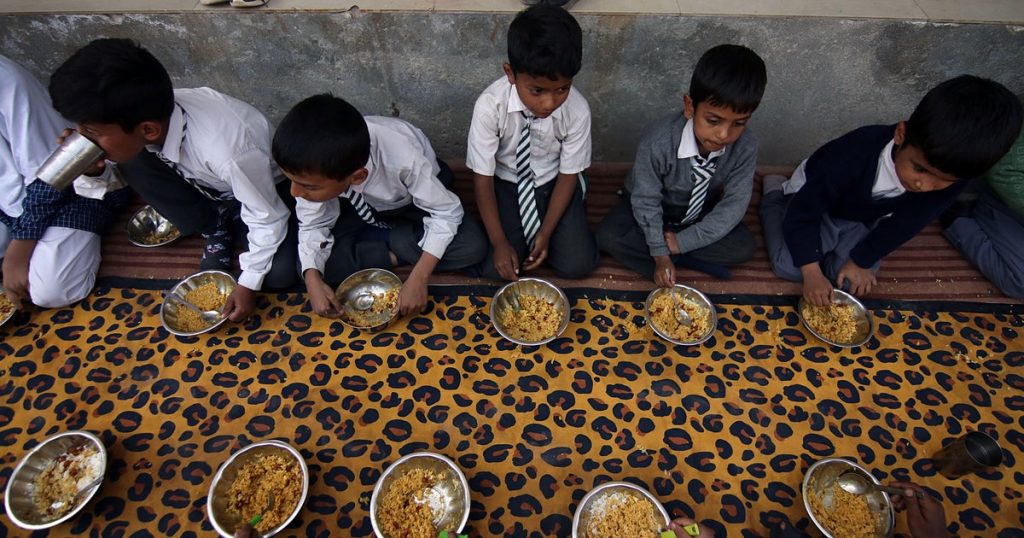Recent reports from India have raised serious concerns regarding food safety in schools after over 100 children became ill from consuming a contaminated midday meal. The incident occurred at a government-run school in Mokama, Bihar, where a dead snake was allegedly found in the food before it was served. In response, the National Human Rights Commission (NHRC) has launched an investigation into the circumstances surrounding the incident, demanding accountability from local authorities.
| Article Subheadings |
|---|
| 1) The Incident Overview |
| 2) Response from Authorities |
| 3) Historical Context and Food Safety |
| 4) Community Reactions |
| 5) The Way Forward |
The Incident Overview
On a seemingly ordinary day in Bihar, one of India’s poorest states, parents sent their children to a government-run school, expecting the usual midday meal provided as part of a government initiative aimed at enhancing student attendance. However, chaos ensued when it was reported that more than 100 children became ill shortly after consuming food that had a disturbing contamination. Witnesses claim that a dead snake was found in the pot of the meal. Despite the alarming discovery, the cook is reported to have served the meal after removing the snake, leading to widespread outrage and a health crisis among the students.
Response from Authorities
The National Human Rights Commission (NHRC) has taken immediate action upon learning of the incident. The NHRC released a statement demanding that local government officials and law enforcement conduct thorough investigations into the claims that over 100 children fell ill after lunch. This incident has prompted the NHRC to request a detailed report from the state officials, aiming to gain insight into both the cause of the illnesses and the health status of the impacted children. The commission emphasized that if the reports are confirmed, it could indicate a significant violation of human rights concerning the students’ welfare.
Historical Context and Food Safety
India’s Mid-Day Meal Scheme, introduced in 1925 in Chennai, was designed to provide nutritious meals to children from underprivileged backgrounds, thus encouraging their enrollment in schools. However, this initiative has faced numerous challenges, particularly concerning food safety standards. Frequent reports of unsanitary conditions and hazardous food have led to significant public outcry. This case harkens back to a tragic incident in 2013 when 23 schoolchildren died after consuming a meal contaminated with pesticides. In the aftermath, the Indian government was urged to enhance food safety measures in educational institutions to prevent such disasters.
Community Reactions
The situation has incited anger within the local community, leading to protests as parents and citizens demand accountability from authorities. Demonstrators blocked roads in response to the distressing news of children falling ill, showcasing the collective frustration over the recurrent issue of food safety in schools. Many parents assert that if the meal scheme is to continue, stringent checks and standards must be enforced to ensure the safety of their children. The NHRC also acknowledged these protests, emphasizing the urgent need for improvements in food handling and preparation within school kitchens.
The Way Forward
As investigations continue, the focus now shifts to ensuring that such incidents do not reoccur. Experts suggest that a combination of rigorous training for food handlers, adherence to strict hygiene protocols, and regular inspections by health authorities would significantly enhance the safety of meals served in schools. It is vital for the government to not only respond to this incident but also to proactively engage in reforming food safety regulations within the educational sector. Ensuring the health and safety of children should be a priority if the Mid-Day Meal Scheme is to fulfill its purpose of fostering education among India’s youth.
| No. | Key Points |
|---|---|
| 1 | More than 100 children in Bihar fell ill after consuming a contaminated school lunch. |
| 2 | A dead snake was reportedly found in the food before it was served to students. |
| 3 | The National Human Rights Commission is investigating the incident and demanding accountability. |
| 4 | The Mid-Day Meal Scheme aims to provide nutritious meals to encourage education among underprivileged children. |
| 5 | Community protests have highlighted the urgent need for improved food safety measures in schools. |
Summary
The incident in Mokama underscores the critical challenges related to food safety within India’s Mid-Day Meal Scheme. With over 100 children falling ill due to alarming negligence, it is imperative for the authorities to act decisively. Ensuring rigorous safety protocols and accountability is essential, not only to safeguard the health of students but also to restore community trust in public food programs.
Frequently Asked Questions
Question: What is the Mid-Day Meal Scheme?
The Mid-Day Meal Scheme is a government initiative in India aimed at providing nutritious meals to children in schools, primarily targeting underprivileged children to encourage educational attendance.
Question: How can food safety be improved in schools?
Food safety in schools can be enhanced by implementing strict hygiene protocols, conducting regular health inspections, and providing training for food handlers to ensure that the meals served are safe for consumption.
Question: What actions can parents take regarding food safety in schools?
Parents can advocate for transparency in food preparation, participate in school meetings to address food safety issues, and demand regular updates from school authorities regarding the health and safety measures in place.


